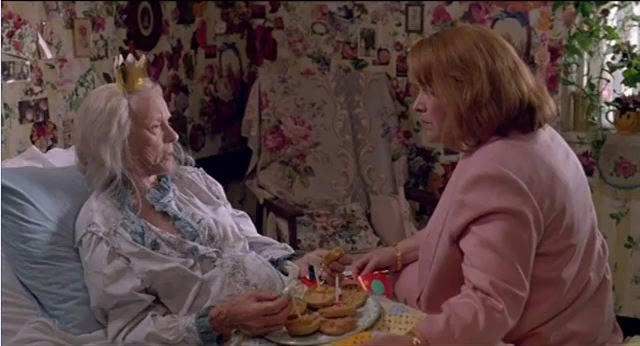
A Beloved Classic in a Changing World
When Fried Green Tomatoes first hit theaters in 1991, it offered a poignant, nostalgic look at friendship, identity, and resilience through generations of Southern women. Audiences were drawn in by the warm storytelling, the charm of the Whistle Stop Café, and the compelling performances by Kathy Bates, Jessica Tandy, Mary Stuart Masterson, and Mary-Louise Parker. But over three decades later, this seemingly cozy tale resonates in new, sometimes more complex ways. Viewed through a modern lens, Fried Green Tomatoes offers deeper messages about gender roles, racism, mental health, and the enduring power of chosen family.
Reclaiming Queerness: Idgie and Ruth’s Relationship Today
In 1991, the bond between Idgie Threadgoode and Ruth Jamison was depicted as intense, devoted, and emotionally intimate—but not explicitly romantic. Though Fannie Flagg’s original novel clearly portrayed their relationship as a romantic one, the film sidestepped this to appeal to mainstream audiences of the time.
Today, viewers and critics alike recognize this subtext as a central queer love story that was hidden in plain sight. In a post-Carol, post-Portrait of a Lady on Fire era, audiences are more attuned to non-traditional love narratives. Idgie and Ruth’s connection would likely be more openly portrayed in a modern retelling, and fans have reclaimed the story as an early representation of lesbian love on screen—subtle, yes, but undeniably powerful.
Racial Dynamics Revisited: Sipsey and Big George

One of the film’s most striking reevaluations comes in how it handles race. Characters like Sipsey (played by Cicely Tyson) and Big George are now viewed with a more critical lens. While they are depicted as loyal and loving, their subservient roles as housekeeper and cook, respectively, reflect the entrenched racial dynamics of the early 20th-century South.
In the 1990s, their portrayal was often seen as heartwarming. But in 2025, audiences expect more agency and voice for Black characters in period dramas. Sipsey’s pivotal act—murdering Frank to protect Idgie’s family—is now celebrated as an act of resistance, not just loyalty. A remake today would likely give her and Big George greater narrative power, depth, and backstory, allowing their choices to reflect individual courage rather than mere devotion.
Evelyn Couch and the Feminist Awakening
Perhaps the most relatable modern storyline is Evelyn’s transformation. In the early ‘90s, her journey from housewife to self-empowered woman was inspiring—but today, it feels even more urgent. Audiences see Evelyn not just as a character, but as a symbol of countless women breaking free from societal expectations, reclaiming space, and redefining themselves later in life.
In the era of the #MeToo movement and the global focus on women’s autonomy, Evelyn’s frustration with being invisible and overlooked is more poignant than ever. Her friendship with Ninny Threadgoode becomes a lifeline—one generation helping the next heal from wounds inflicted by patriarchy. This dynamic has only grown in emotional relevance for modern audiences.
Mental Health, Grief, and the Unspoken
The film touches on complex themes such as grief, depression, and the long-term impact of trauma. Idgie’s rebellion stems not just from personality, but from deep emotional wounds—her brother Buddy’s death, Ruth’s suffering, the rigid expectations placed on women. Evelyn’s anger, too, comes from a lifetime of suppressing her needs.
Today, we are better at recognizing these symptoms as mental health struggles. What was once read as eccentricity or emotional instability is now acknowledged as grief, anxiety, or PTSD. These characters are not just colorful—they are survivors, making the best of their emotional realities in a world that gave them few tools.
Legacy and Intergenerational Healing
The film’s power lies in its structure—a story within a story, unfolding across generations. This intergenerational thread is even more powerful now, in an era when younger audiences are rediscovering the wisdom of older voices. Ninny Threadgoode, who once seemed like a quirky old lady with stories to tell, now represents something deeper: the sacred act of preserving memory, passing on resilience, and giving voice to lives that history might otherwise forget.
Evelyn’s transformation is made possible because Ninny shares her story. Today, we understand this as more than friendship—it’s healing across time, the restoration of forgotten women’s narratives, and a testimony to the strength found in connection.
Final Thoughts: A Timeless Story, More Relevant Than Ever
If you watch Fried Green Tomatoes in 2025, it won’t feel like just a sweet Southern tale of fried food and old memories. It hits harder. It challenges more. It makes us reflect not only on who we were, but who we are becoming. It reminds us that love—whether romantic or platonic—can be the most radical act of all.
And perhaps most importantly, it proves that stories centered on women, their friendships, their pains, and their triumphs, will never go out of style. They only grow more powerful with time.
